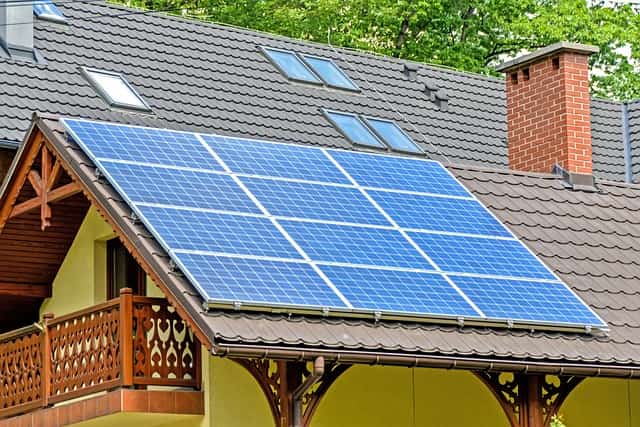Solar panels are fast becoming one of the most popular sources of renewable energy, and for good reason. Not only do they provide a clean and sustainable way to generate electricity, but they can also help reduce our dependence on fossil fuels and reduce our carbon footprint. In this article, we will discuss the 5 main advantages of installing solar panels, how they work, and their benefits.
What is a Solar Panel?
A solar panel, also known as a photovoltaic (PV) panel, is a device that converts sunlight into electricity. It is made up of several solar cells, which are made of silicon or other materials that can absorb photons (light particles) from the sun. When photons strike the solar cell, they knock electrons loose from the atoms in the material, creating a flow of electricity.
How Do Solar Panels Work?
Solar panels work by converting the energy from the sun into electricity that can be used to power homes and businesses. The solar cells in the panel are arranged in a grid-like pattern, and when sunlight hits the cells, it creates a flow of electricity. This electricity is then collected by wires and sent to an inverter, which converts the DC electricity into AC electricity that can be used to power appliances and other devices.
Five benefits of installing solar panels on your home
There are many benefits to using solar panels as a source of electricity. Some of the most significant benefits include:
1.Clean and Renewable Energy: Solar panels do not produce any greenhouse gas emissions, making them a clean and sustainable source of energy. They also do not deplete any finite resources, unlike fossil fuels.
2. Lower Energy Bills: By generating your own electricity, you can reduce your reliance on the grid and save money on your energy bills. In some cases, you may even be able to sell excess electricity back to the grid.
3. Increased Home Value: Installing solar panels on your home can increase its value and make it more attractive to potential buyers.
4. Reliability: Solar panels have no moving parts, making them extremely reliable and requiring little maintenance.
5. Energy Independence: By generating your own electricity, you can become more energy independent and reduce your reliance on fossil fuels.
- इन्हें भी जरूर पढ़ें
- साल भर बिजली Free करने का ये तरीका हो रहा जमकर Viral, लाखों ग्राहक अपना रहे हैं ये तरीका
- ये Radio चलेगा जिंदगी भर Free में बिना बिजली और बिना सैल के
- Download Taaza Khabar (Bhuvan Bam) Web Series in 720p, HD-1080p
Conclusion
Solar panels are a clean and sustainable way to generate electricity, and they offer numerous benefits to homeowners and businesses. Whether you are looking to save money on your energy bills, reduce your carbon footprint, or increase your home’s value, solar panels are a great option to consider. With the continued advancement of solar technology, it is likely that we will see even more widespread adoption of solar panels in the future.
FAQs About Solar Panels
Q: What are solar panels?
A: Solar panels are devices that convert sunlight into electricity. They are made up of solar cells, which are made of semiconductor materials that absorb photons from the sun and release electrons, producing an electric current.
Q: How do solar panels work?
A: Solar panels work by converting the energy in sunlight into electrical energy. The solar cells inside the panels absorb photons from the sun, which release electrons and create a flow of electricity. This electricity can be used to power homes, businesses, and other electrical devices.
Q: How efficient are solar panels?
A: The efficiency of solar panels varies depending on the type of panel, the quality of the solar cells, and the conditions under which they are used. On average, most solar panels have an efficiency rating of between 15-20%, although some high-end panels can have an efficiency rating of over 25%.
Q: What is the lifespan of a solar panel?
A: The lifespan of a solar panel can vary depending on the quality of the panel and the conditions under which it is used. On average, most solar panels have a lifespan of between 25-30 years, although some panels can last up to 40 years or more.
Q: How much energy can a solar panel produce?
A: The amount of energy a solar panel can produce depends on the size and efficiency of the panel, as well as the amount of sunlight it receives. On average, a typical solar panel can produce between 250-400 watts of power, although larger panels can produce up to 600 watts or more.
Q: Do solar panels work in cloudy weather?
A: Yes, solar panels can still generate electricity even on cloudy days, although the amount of electricity they generate will be less than on sunny days. However, if the clouds are too thick, the panels may not generate any electricity at all.
Q: Can solar panels be installed on any roof?
A: Solar panels can be installed on most types of roofs, including flat roofs, sloped roofs, and even some curved roofs. However, the suitability of a particular roof for solar panel installation will depend on factors such as the roof’s orientation, shading, and structural integrity.
Q: How much do solar panels cost?
A: The cost of solar panels can vary depending on the size, quality, and manufacturer of the panels, as well as the cost of installation. On average, the cost of a solar panel installation ranges from $10,000-$20,000, although there are many variables that can affect the final cost.
Q: Are there any incentives for installing solar panels?
A: Yes, there are many incentives available for homeowners and businesses who install solar panels, including tax credits, rebates, and other financial incentives. These incentives can help reduce the cost of a solar panel installation and make it more affordable for homeowners and businesses.




Very nice information thank you